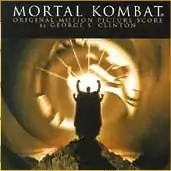Mortal Kombat (1995 score)
Mortal Kombat: Original Motion Picture Score is the instrumental score album released to accompany the Mortal Kombat film. The music was composed by George S. Clinton with additional guitar work provided by Buckethead and drums by Brain.
| Mortal Kombat: Original Motion Picture Score | |
|---|---|
 | |
| Film score by | |
| Released | October 11, 1995 |
| Genre | Electronica |
| Length | 42:01 |
| Label | Rykodisc |
Clinton based his main themes on traditional taiko drums, emphasizing the film's mystical atmosphere and Asian-influenced style. It is also notable that he used Shakuhachi flute, didgeridoos and a Tuvan throat singer to give a more exotic musical landscape unlike other similar scores of the early 1990s.
In an interview with The Hollywood Reporter celebrating the 20th anniversary of the film, Clinton said,
For the first test screening they had put a temporary score under it that was mainly traditional orchestral action music, and it became clear that the target audience, which was used to hearing techno music blasting during game play, was not happy with that approach. So that gave me the opportunity to come up with an approach I called “Techno-Taiko-Orcho.” My score would have a techno core with a layer of Asian ethnic instruments (Taiko drums, shakuhachi, Tuvan throat singer) surrounded by an orchestra. But not just a regular orchestra, a Testosterone Orchestra. No treble clef instruments (no flutes, clarinets, trumpets, violins, etc.). Just 18 violas, 14 celli, six basses and lots of low brass — and percussion. It was massive. When music supervisors John Houlihan and Sharon Boyle introduced me to guitar wizard Buckethead, I knew he would become a major element in my score as well.[1]
Clinton also created the sound effect that suggests the presence of Shang Tsung in the film echoing the usage of multiple didgeridoos in a hall, a popular musical choice along with segments of this score that are used extensively in other film teasers and trailers,[2] most notable in Roland Emmerich's Godzilla and the Final Destination franchise.
The album contains two tracks not used in the film named "Farewell" and "Kids" with the latter heard at the end of the sequel Mortal Kombat: Annihilation.
Reception
The score was well received by fans of the movie and the video game.[3] Los Angeles Times critic Kevin Thomas characterized it as a "driving, hard-edged" score.[4] George S. Clinton went to receive a BMI Film award for his work on the film in 1996.
Track listing
- "A Taste of Things to Come"
- "Liu Vs. Sub-Zero"
- "It Has Begun"
- "The Garden" featuring Buckethead
- "Goro Vs. Art" featuring Buckethead
- "Banquet" featuring Buckethead
- "Liu Vs. Kitana"
- "Liu's Dream" featuring Buckethead
- "Liu Vs. Reptile" featuring Buckethead
- "Stairway"
- "Goro Goro" featuring Buckethead
- "Kidnapped"
- "Zooom"
- "Johnny Vs. Scorpion" featuring Buckethead
- "Hand and Shadow" featuring Buckethead
- "Scorpion and Sub-Zero" featuring Buckethead
- "Soul Snatchin'"
- "On the Beach"
- "Johnny Cage" featuring Buckethead
- "Goro Chase" featuring Buckethead
- "Evening Bells"
- "Monks"
- "Friends"
- "Flawless Victory" featuring Buckethead
- "Farewell"
- "Kids"
References
- http://www.hollywoodreporter.com/heat-vision/mortal-kombat-movie-oral-history-815287
- ""Mortal Kombat Score" review". SoundtrackNet. Retrieved 2015-05-12.
- ""Mortal Kombat Score" review". Amazon.com. Retrieved 2015-05-12.
- ""Mortal Kombat Score" review". LA Times. Retrieved 2015-05-12.